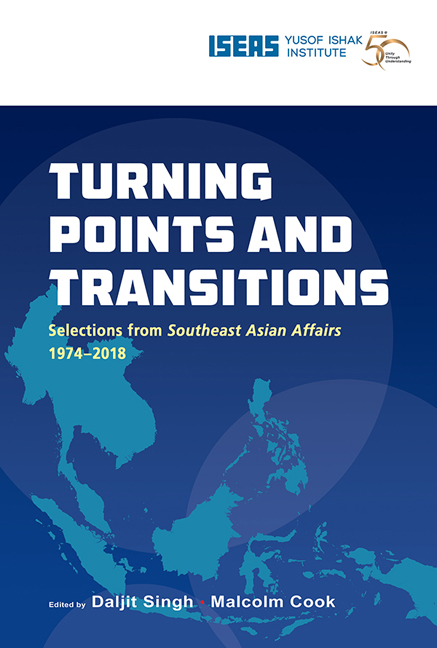Book contents
- Frontmatter
- Contents
- Message from the Director
- Foreword
- Foreword
- Introduction
- THE REGION
- The Diplomatic Emergence of China and Its Implications for Southeast Asia (1975*)
- Stability and Security in the Region after ANZUK (1975)
- The Question of the “Overseas Chinese” (1976)
- Southeast Asia 1976: The Handling of Contradictions (1977)
- The “Fukuda Doctrine” and Its Implications for Southeast Asia (1978)
- Expanding Horizons in Southeast Asia? (1994)
- AFTA in the Light of New Economic Developments (1995)
- The ASEAN Economic Miracle Unravels (1999)
- Southeast Asia in 1999: A False Dawn? (2000)
- East Timor's Future: Southeast Asian or South Pacific? (2001)
- Southeast Asia in 2002: From Bali to Iraq — Co-operating for Security (2003)
- The Year in ASEAN: The Charter, Trade Agreements, and the Global Economic Crisis (2010)
- Seeking Stability in Turbulent Times: Southeast Asia's New Normal? (2015)
- China's Two Silk Roads Initiative: What It Means for Southeast Asia (2015)
- China's International Strategy and Its Implications for Southeast Asia (2016)
- BRUNEI
- CAMBODIA
- INDONESIA
- LAOS
- MALAYSIA
- MYANMAR
- THE PHILIPPINES
- SINGAPORE
- THAILAND
- VIETNAM
Stability and Security in the Region after ANZUK (1975)
from THE REGION
Published online by Cambridge University Press: 29 May 2019
- Frontmatter
- Contents
- Message from the Director
- Foreword
- Foreword
- Introduction
- THE REGION
- The Diplomatic Emergence of China and Its Implications for Southeast Asia (1975*)
- Stability and Security in the Region after ANZUK (1975)
- The Question of the “Overseas Chinese” (1976)
- Southeast Asia 1976: The Handling of Contradictions (1977)
- The “Fukuda Doctrine” and Its Implications for Southeast Asia (1978)
- Expanding Horizons in Southeast Asia? (1994)
- AFTA in the Light of New Economic Developments (1995)
- The ASEAN Economic Miracle Unravels (1999)
- Southeast Asia in 1999: A False Dawn? (2000)
- East Timor's Future: Southeast Asian or South Pacific? (2001)
- Southeast Asia in 2002: From Bali to Iraq — Co-operating for Security (2003)
- The Year in ASEAN: The Charter, Trade Agreements, and the Global Economic Crisis (2010)
- Seeking Stability in Turbulent Times: Southeast Asia's New Normal? (2015)
- China's Two Silk Roads Initiative: What It Means for Southeast Asia (2015)
- China's International Strategy and Its Implications for Southeast Asia (2016)
- BRUNEI
- CAMBODIA
- INDONESIA
- LAOS
- MALAYSIA
- MYANMAR
- THE PHILIPPINES
- SINGAPORE
- THAILAND
- VIETNAM
Summary
Implicit in the Five Power Defence Arrangements (FPDA) of 16 April 1971 is an assessment, generally agreed upon by the participating states, of the contemporary situation in Southeast Asia. Explicit in ANZUK, established in November 1971, is the action which Australia, New Zealand, and the United Kingdom agreed at the time was required in the circumstances by their national interests, and which was acceptable to Malaysia and Singapore, the other two partners. But in the changed circumstances of 1974 their assessments of the regional situation have diverged, and priorities in the pursuit of national interests have been changed by political choices and economic pressures. ANZUK (an integrated command of the three services set up by Australia, New Zealand, and the United Kingdom independently of the FPDA on the grounds of efficiency and economy), a modus operandi of the FPDA, was neither its purpose nor its prescription. With the end of the process of dismantling ANZUK on 1 January 1975, the FPDA remains intact as a convention of consultation on what is still agreed to be an area of common concern, though not necessarily of common diagnosis in description, or common direction of action. The strategic baby has not been thrown out with the tactical or political bath-water. Whether it will be more or less effective as a pentagonal pattern of power without ANZUK can only be assessed in the light of the new circumstances as reflected in the five facets of the national interests of the members.
Changed Circumstances
What were the circumstances out of which grew both the Five Power Defence Arrangements and the ANZUK Force? The precipitating issue was the announcement by the British in 1968 of the accelerated and specific timetable of their withdrawal from their base in Singapore, and from their commitments under the Anglo-Malayan Defence Agreement. The robust image of Mountbatten of SEAC (Southeast Asia Command) in 1945 and of Mountbatten of India in 1947 had faded in the eyes of the world and in the esteem of the British people. Dilatory, if not dilettante, strategic thinking was caught up by the urgencies of political party change and economic stringency which set the background and the pace of the Labour Government's announcement in 1968 of complete British withdrawal before the end of 1971, thus setting the terminal date by which alternative arrangements were required to be made.
- Type
- Chapter
- Information
- Turning Points and TransitionsSelections from Southeast Asian Affairs 1974-2018, pp. 9 - 19Publisher: ISEAS–Yusof Ishak InstitutePrint publication year: 2018

